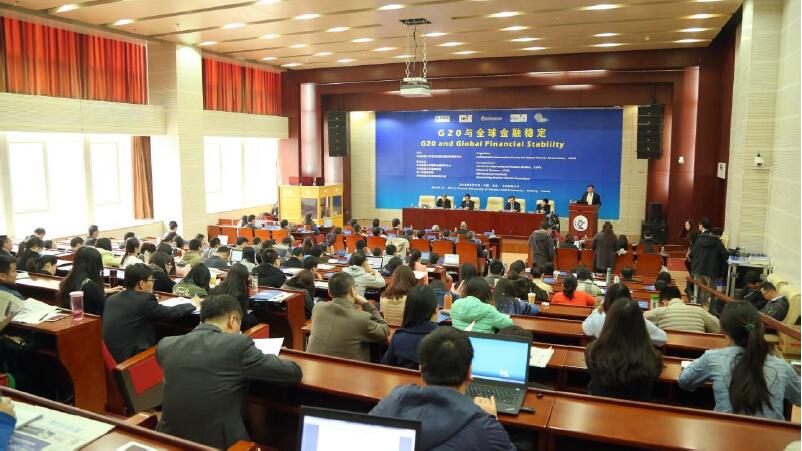
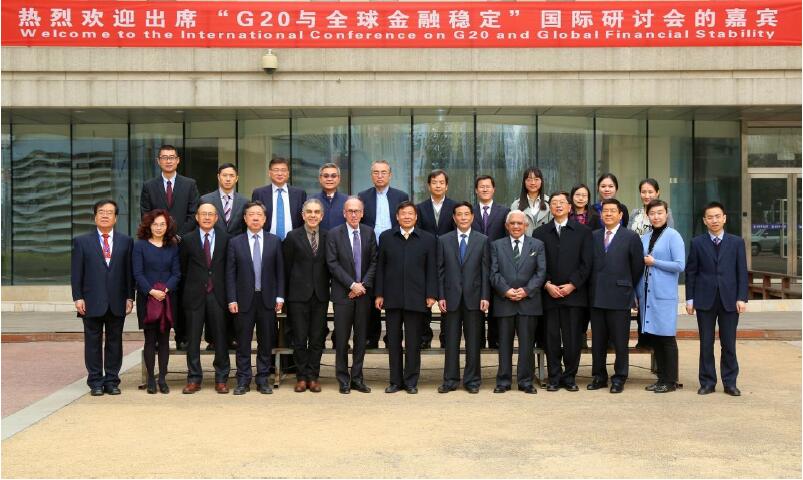
March 22, sponsored by the global financial governance Collaborative Innovation Center of CUFE and co-organized by School of Finance of CUFE, First Financial Research Institute and the Bretton Woods institutions and a number of reconstruction committee, “G20 and Global Financial Stability" International seminar was held at the Academic Hall 202 in Central University of Finance and Economics. More than 20 speakers from France, the United States, South Korea, Japan, Indonesia, Hong Kong and the mainland, as well as nearly 200 scholars and teachers and students from the Central University of Finance and Economics and domestic universities, research institutions and the media attended the forum.
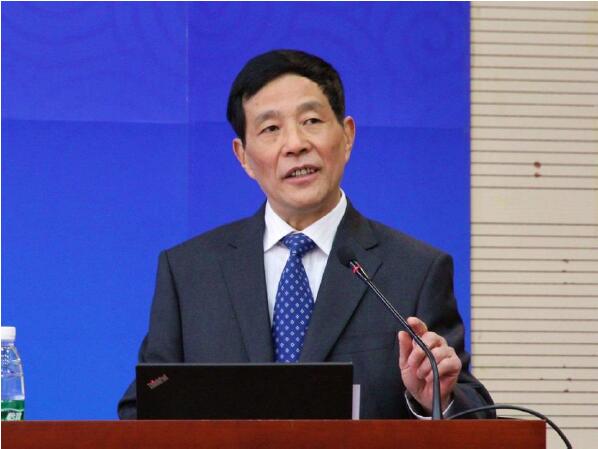
Prof. Wang Guangqian, president of Central University of Finance and Economics, delivered a welcome speech. President Wang gave a warm welcome to the guests and wished a successful meeting. He pointed out that today global economy is in a deep adjustment process, the Fed's monetary policy is highly concerned, and Japan and the EU’s negative interest rates, capital outflows in emerging markets, international commodity prices falling and other problems challenge the global economic recovery. This seminar will explore these issues and challenges, provide academic support for the forthcoming G20 summit in China and has a very important significance.
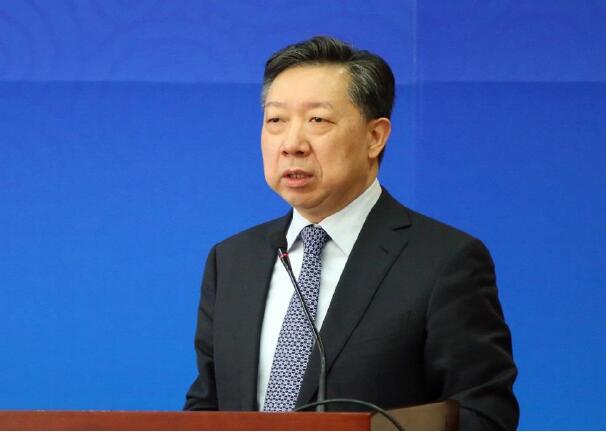
zhang Li Qing, the President of Academic Committee of school of finance, director of global financial governance Collaborative Innovation Center delivered the opening speech, explained in detail the theme of this meeting. Professor Zhang Liqing noted that the G20 summit which is going to be held this September in Hangzhou has special significance for China and is a good opportunity for China’s promoting global economic policy coordination and financial governance reforms. Among the issues in the G20 summit, global financial stability is undoubtedly the most important one. The seminar will focus on in-depth research in four areas. First, the Fed is expected to live, how to be actively pursued among the major economies, macroeconomic policy coordination, policy options and their own ways to avoid conflicts and contradictions arising therefrom; second, how to continue to promote the summit was first proposed in 2011 in France the global financial architecture reform, together create an environment conducive to long-term stability of the global financial and equitable international financial system; and third, international capital flows has long been one of the root causes of the global financial turmoil and emerging market economies, how it strengthen management, in particular for global joint action; fourth, how G20 policy dialogue mechanism itself to reform and innovation, enhance its legitimacy and execution, so as to better improve their efficiency and effectiveness in global financial stability. Answers to these questions are essential for the global financial markets and short-term macroeconomic stability and long-term stable development of the international financial system. The seminar will focus on these issues in-depth discussion, and hope to provide a useful reference for G20 summit topic selection and content design.
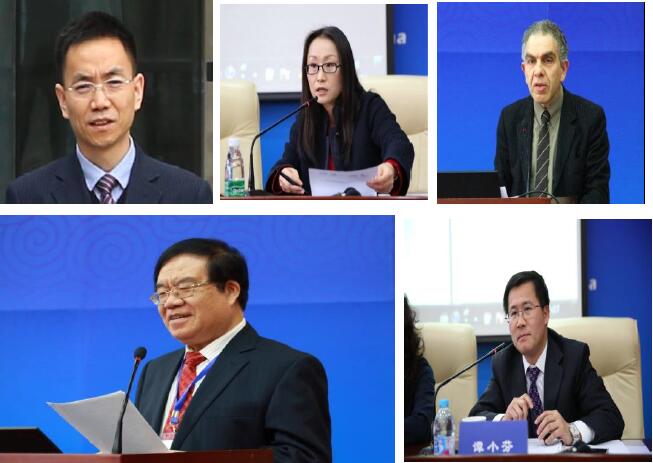
The opening ceremony is hosted by Professor Li Jianjun, vice president of school of finance of CUFE. Later chaired keynote speeches and lectures are hosted respectively by director of global financial governance Collaborative Innovation Center Zhang Li Qing, president of First Financial Research Institute Yang Yanqing, former deputy SAFE Secretary Mr. Wei, professor of the Executive Director of the Bretton Woods system redevelopment Committee Marc Uzan, deputy director of the innovation center of global financial governance coordination Tan Xiaofen.
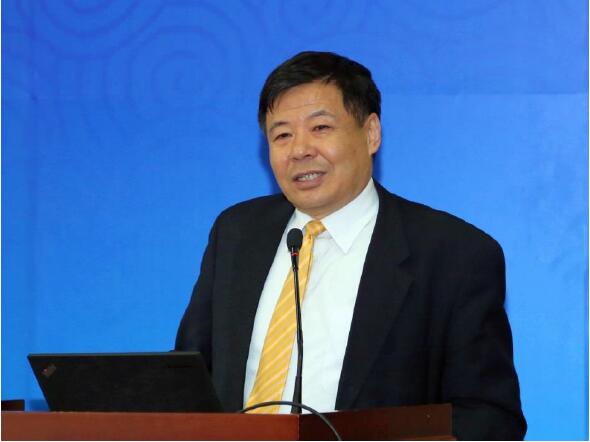
Vice Finance Minister Zhu Guangyao published the first keynote speech named "issues and progress in Hangzhou G20 summit". Vice Minister Zhu briefly introduced the Chinese government's principled stand on this G20 summit meeting in Hangzhou and readiness of the summit. He noted that this meeting will restore international financial architecture reform working group and the establishment of green finance working group, which is China's contribution to the G20 summit in Hangzhou subject area. Speaking of global macroeconomic policy coordination, he noted that the current national monetary policy has been applied to the limit, but many countries in terms of fiscal policy there is a great use of space. As the rotating presidency of the G20 summit, China should further strengthen communication and coordination with macroeconomic policies among G20 members and give full play to the role of global economic policy dialogue platform.
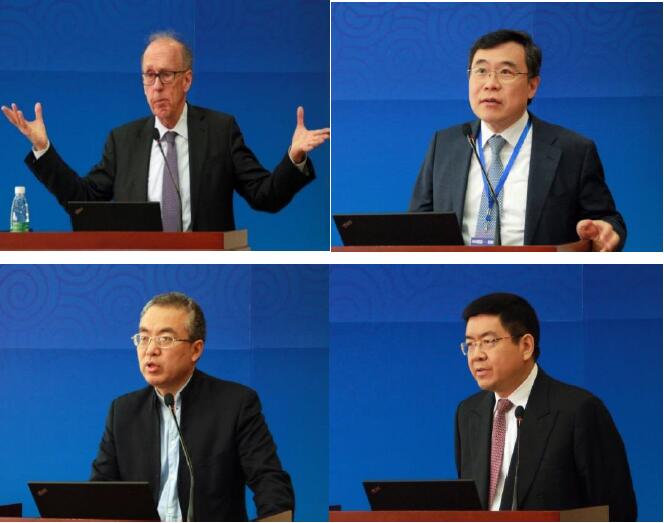
In the first keynote speech entitled "global macroeconomic policy coordination under the Fed rate hike expectations" at the morning, Professor of Economics at Yale University, Stephen Roach, the Korean International Economic Policy Research Institute, Li Heng, China People's Bank Financial Research director Yao Yudong, China international Capital Corporation Limited Managing Director Huang Haizhou were made a wonderful speech. Professor Stephen Roach analyzes the changing international situation in recent years occurred by analyzing China, US, EU and Japan, the similarities and differences in the foam, as well as enterprise resource zombie twist aspects raised in China may accelerate the pace of reform of state-owned enterprises, increase market Configuring the intensity of resources. Lee Heng Dean combed over the years with the evolution of the G20 summit issues, on the challenges that exist in the current G20 summit, namely the difference in developed and emerging market countries in the monetary policy concept: the developed countries in the hope of a single monetary policy objectives and the implementation of market-oriented exchange rate system; emerging market countries will not want to greater volatility in the exchange rate. Defects crisis the international monetary system and global liquidity shortage problem after Yao Yudong, director focused on. He pointed out that we are facing a global lack of liquidity, which is commodity prices, prices of risky assets and emerging market economies will have a profound impact. Dr. Huang Haizhou to anchor inflation expectations expressed their views. He pointed out that monetary policy cannot be effective, after the crisis we are in a liquidity trap, it should coordinating national monetary policy by G20 and take reforms both in the demand-side and supply-side to help the global economy out of the woods.
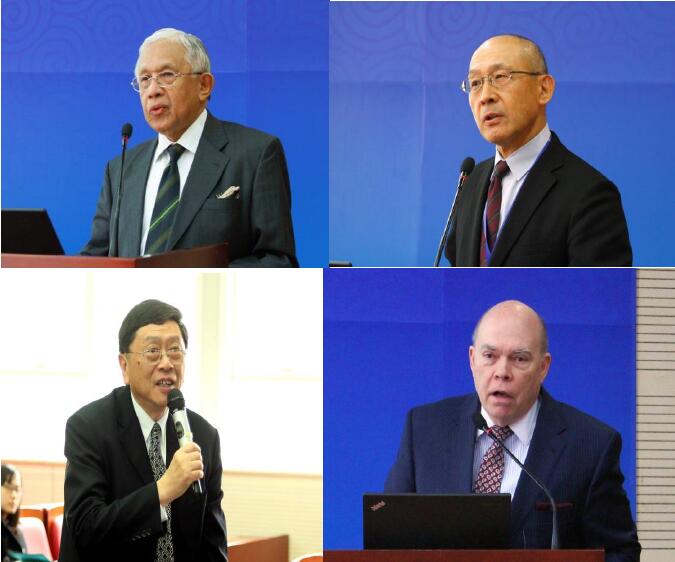
In the second keynote speech entitled "reform of the international financial system?: What's next", Professor of Economics, University of Tokyo, former dean of the Asian Development Bank Masahiro Kawai, professor of economics at the University of Indonesia, former Indonesian central Bank Deputy governor Anwar Nasution, Shanghai development Research Foundation Vice President and Secretary Joey Germany, the former US Treasury for international Affairs Assistant Olin Wethington have spoken. Prof. Kawai around sovereign currency as an international currency stability whether delivered a speech, and focused on issues related to the internationalization of RMB. His international experience started from the analysis of the RMB as an international currency of favorable conditions and adverse conditions. He believes that, based on Krugman, China in the short term should be strict capital controls, to ensure the stability and independence of monetary policy, exchange rate; in the long run should be increased capital flows and adopt a more flexible exchange rate system. Professor Nasution gave his speech on the reform of the international financial framework. He stressed the importance of the global financial safety net and advocate to accelerate the reform of the International Monetary Fund, in order to improve the global financial safety nets. Joey De vice president explained the purpose of the international financial architecture reform, the short-term and long-term goals, and IMF reforms put forward concrete proposals. He proposed that the IMF should increase the voting power of emerging economies, expand the scope of the SDR basket currencies, enhancing the role of the SDR. Mr. Wethington analyzes the main problems of the international financial architecture from the perspective of political economy. He proposed to strengthen the institutional construction of G20 and to promote the effective implementation of the agreements reached.
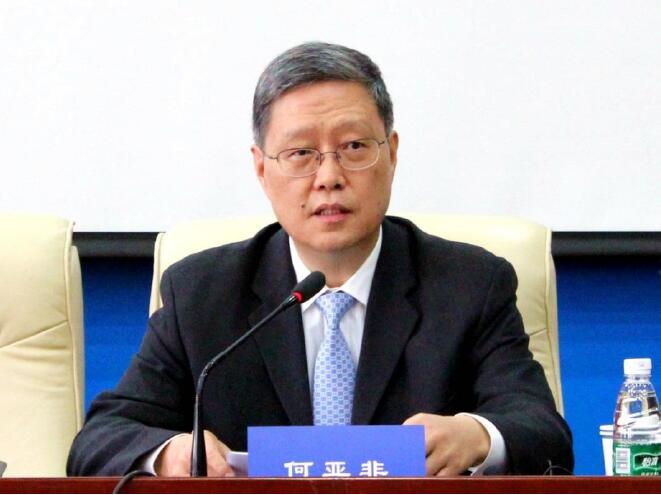
In the second keynote speech, former Chinese Vice Minister of Foreign Affairs He Yafei, who served as China's G20 coordinator made a wonderful speech "How to enhance the role of G20 in policy formulation," the. He noted that the 2016 G20 summit has two main themes, namely, economic growth and the reform of global governance. He expressed his views about the importance of the G20 Ministers, the challenge facing the G20 summit and Hangzhou. In his view, G20 is the only mechanism currently developed and emerging economies equal dialogue is an important mechanism to improve the international governance system, should attach great importance to and fully play its role. G20 faces legitimacy, decision-making and low efficiency, the challenge by the geopolitical constraints and other factors; therefore, he suggested, should be set up as soon as possible G20 secretariat to accelerate institutional construction, in order to better play its positive role. For Hangzhou summit, he thought it should focus on innovation and growth, global economic governance reform and economic importance to the development of these three areas.
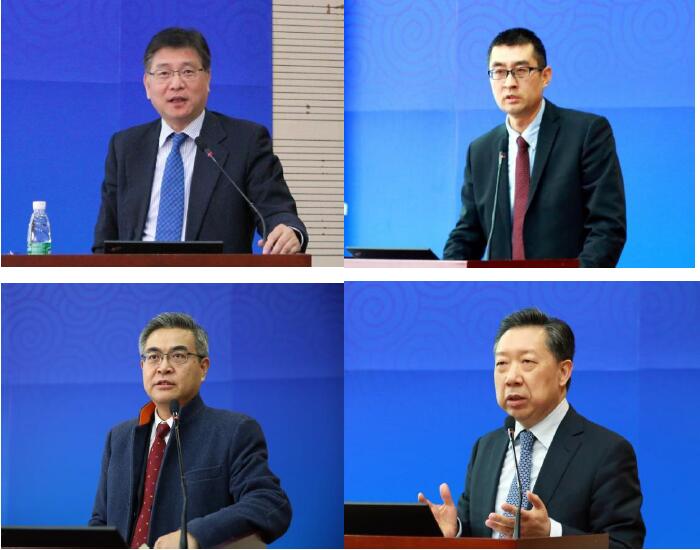
In the third key note speech entitled "International Capital Flows management environment of global financial turmoil" held in the afternoon, the BNP Paribas chief economist Chen Xingdong, Asia, the former State Administration of Foreign Exchange Capital Management Division Sun Lu Professor Jun, Professor of economics and Finance, University of Hong Kong, Xiao Geng and global financial governance collaborative innovation Center, central University of Finance and economics Renzhang Li Qing made speeches. Mr. Chen Xingdong analyzes the trends and causes of global capital flows disorder, discusses the Chinese international payments imbalances and capital outflows reasons and remedies. He suggested that Chinese enterprises should be required to restore the normal state of foreign exchange, and strictly control capital flight. Mr. Sun Lujun discuss internal and external factors Chinese capital outflows. He believes that China's capital outflow trend has been and will continue to slow down; in order to better cope with capital flight, our policy on the RMB exchange rate is expected to be stable, to take temporary capital controls, continue to promote the exchange rate reform, building of cross-border capital flows external debt management and macro-prudential policy framework, and to promote orderly capital account convertibility. Professor Xiao Geng discusses the main reasons of international capital flows, noting that China can stabilize the exchange rate, stable and efficient investment, issuing bonds and strengthen Sino-US cooperation and other measures to deal with international capital flows. Professor Zhang Liqing noted that international capital flows and the irrational volatility is one of the root causes of the financial crises in emerging market countries and the global financial turmoil, and external factors such as US monetary policy is leading to massive capital flows to emerging markets and cyclical and destabilizing the main factors of the crisis. Therefore, action should be initiated global management of international capital flows, which not only emerging market countries need to strengthen the management of capital flows, the developed countries should make the necessary capital outflow management. He suggested that the G20 summit list international capital flows as an important management issue, and take discussions on global "Tobin tax" levied.
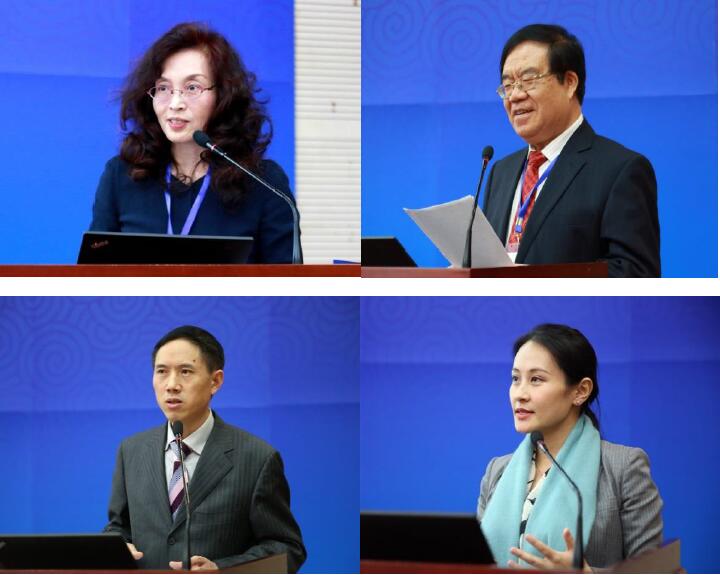
In the fourth keynote speech entitled "How to play a more effective role in the G20 global financial stability", the Chinese Academy of International Finance Research Center Rengao Hai Hung, former deputy director of the State Administration of Foreign Exchange Mr Wei, China International Economic and Finance Renzhou Jiang Wu main think tank, the international Finance Research Center, central University of Finance Dr. Tao Kunyu respectively delivered a wonderful speech. Gao Haihong researchers analyzed G20 differs from other international financial institutions and groups in governance architecture proposed G20 should strengthen its responsibility to strengthen macroeconomic policy coordination, maintain the foreign exchange market stability, managing speculative capital flows, strengthen global financial safety nets and other core areas and actively promote global financial cooperation. Mr. Wei Benhua discussed regional cooperation in the financial safety net and global levels between the two. He proposed, and should increase the share of voting rights of developing countries in the IMF, reform the SDR attention to the importance of developing countries to strengthen coordination between the IMF and regional financial safety net and balance. Zhou Wu Zhuren recalled the contribution of the G20 to promote international monetary system reform made in the analysis of the existing mechanisms of defect G20 and G20 made recommendations to improve the mechanism construction. Dr. Tao Kunyu analyzed the reasons why G20 influence is weakened and put forward to strengthen the important role of the Financial Stability Board and other existing institutions in maintaining global financial stability, and make efforts for emerging economies to play roles in the G20 process.
Finally, Professor Zhang Liqing gave the meeting summary. He pointed out that, through extensive and in-depth exchanges and discussions, the meeting got very fruitful results and achieved the desired purpose. After the meeting, an important point of the meeting organizers will produce further consolidation and provide G20 working groups and other relevant reference. Meanwhile, we hope to continue to promote and expand the theoretical study of these topics, in order to better provide academic support for decision-making in related fields.